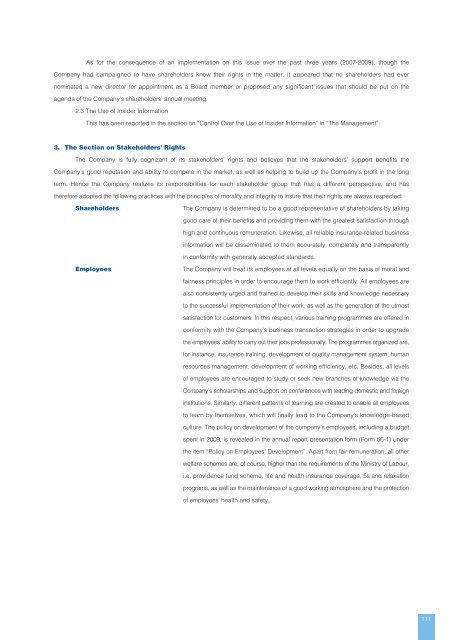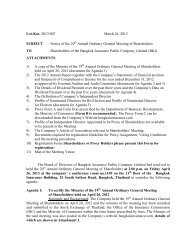PRINCIPLES OF GOOD CORPORATE GOVERNANCE
PRINCIPLES OF GOOD CORPORATE GOVERNANCE
PRINCIPLES OF GOOD CORPORATE GOVERNANCE
Create successful ePaper yourself
Turn your PDF publications into a flip-book with our unique Google optimized e-Paper software.
As for the consequence of an implementation on this issue over the past three years (2007-2009), though the<br />
Company had campaigned to have shareholders know their rights in the matter, it appeared that no shareholders had ever<br />
nominated a new director for appointment as a Board member or proposed any significant issues that should be put on the<br />
agenda of the Company’s shareholders’ annual meeting.<br />
2.3 The Use of Insider Information<br />
This has been reported in the section on “Control Over the Use of Insider Information” in “The Management”.<br />
3. The Section on Stakeholders’ Rights<br />
The Company is fully cognizant of its stakeholders’ rights and believes that the stakeholders’ support benefits the<br />
Company’s good reputation and ability to compete in the market, as well as helping to build up the Company’s profit in the long<br />
term. Hence the Company realizes its responsibilities for each stakeholder group that has a different perspective, and has<br />
therefore adopted the following practices with the principles of morality and integrity to insure that their rights are always respected:<br />
Shareholders<br />
The Company is determined to be a good representative of shareholders by taking<br />
good care of their benefits and providing them with the greatest satisfaction through<br />
high and continuous remuneration. Likewise, all reliable insurance-related business<br />
information will be disseminated to them accurately, completely and transparently<br />
in conformity with generally accepted standards.<br />
Employees<br />
The Company will treat its employees at all levels equally on the basis of moral and<br />
fairness principles in order to encourage them to work efficiently. All employees are<br />
also consistently urged and trained to develop their skills and knowledge necessary<br />
to the successful implementation of their work, as well as the generation of the utmost<br />
satisfaction for customers. In this respect, various training programmes are offered in<br />
conformity with the Company’s business transaction strategies in order to upgrade<br />
the employees’ ability to carry out their jobs professionally. The programmes organized are,<br />
for instance, insurance training, development of quality management system, human<br />
resources management, development of working efficiency, etc. Besides, all levels<br />
of employees are encouraged to study or seek new branches of knowledge via the<br />
Company’s scholarships and support on conferences with leading domestic and foreign<br />
institutions. Similarly, different patterns of learning are created to enable all employees<br />
to learn by themselves, which will finally lead to the Company’s knowledge-based<br />
culture. The policy on development of the company’s employees, including a budget<br />
spent in 2009, is revealed in the annual report presentation form (Form 56-1) under<br />
the item “Policy on Employees’ Development”. Apart from fair remuneration, all other<br />
welfare schemes are, of course, higher than the requirements of the Ministry of Labour,<br />
i.e. providence fund scheme, life and health insurance coverage, 5s and relaxation<br />
programs, as well as the maintenance of a good working atmosphere and the protection<br />
of employees’ health and safety.<br />
111







